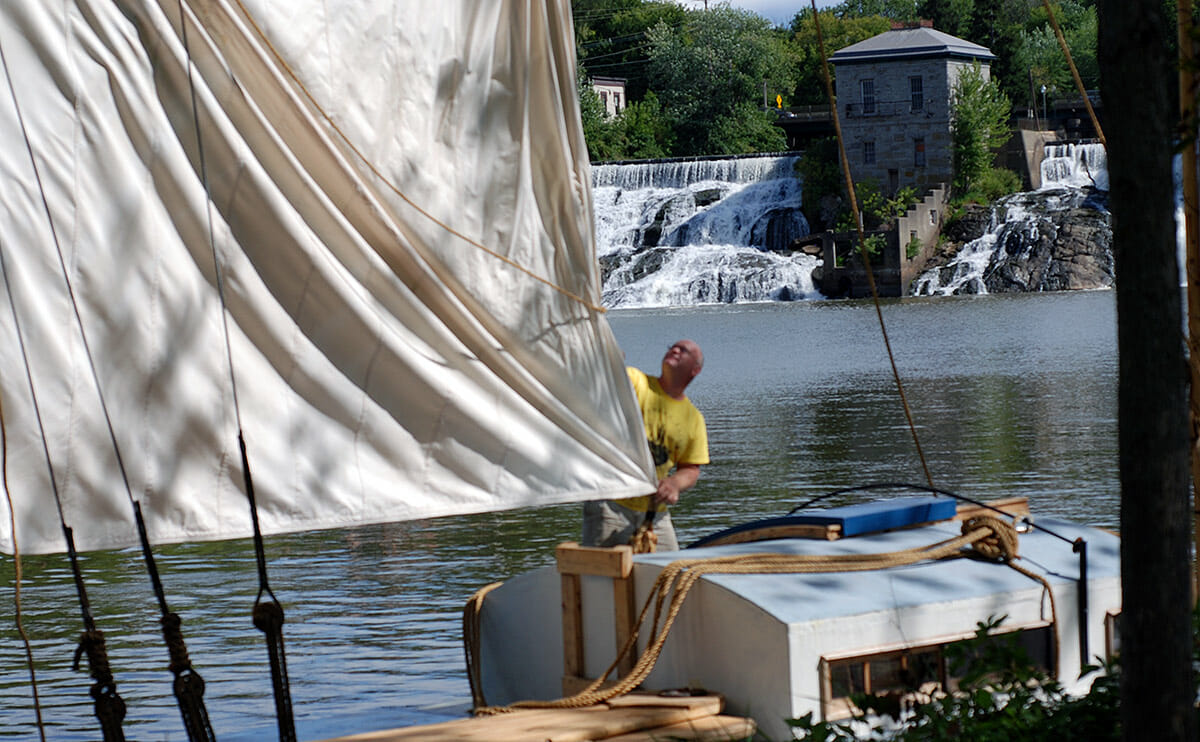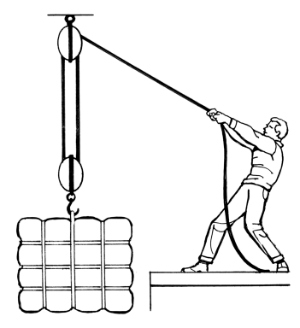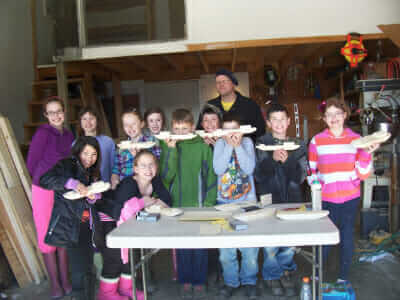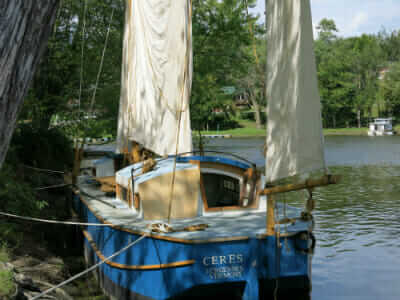A Farmer Sets Sail
On a recent drive from his farm to Otter Creek, he makes little eye contact, answers questions sparingly. Andrus seems detached from the project he's been working on for months, li...
A Farmer Sets Sail
On a recent drive from his farm to Otter Creek, he makes little eye contact, answers questions sparingly. Andrus seems detached from the project he's been working on for months, li...

On a recent drive from his farm to Otter Creek, he makes little eye contact, answers questions sparingly. Andrus seems detached from the project he’s been working on for months, like it’s an academic exercise. It’s not until he climbs aboard his sail-powered barge, Ceres — named for the goddess of fertility and grain crops — that his inner firebrand comes out.
“The modern farmer needs to turn heads, make the public know who they are,” says Andrus, creator of the Vermont Sail Freight Project. “If you’re anonymous, you’re dead.”
In the wee town of Vergennes, there’s little risk of Andrus going anonymous. He’s a farmer who boldly decided to grow rice — a tropical crop — in the wetlands of Northern Vermont. He’s a baker who peddles bread in town, using an old-timey draft horse and wagon. He’s an outspoken sustainability advocate, holding forth on opinion pages and radio shows. And he’s the guy who’s bringing farm goods to New York City, on a sailboat built by hand.
Ceres will make its maiden voyage in early October. The plan is to dock at 10 different wharfs between Lake Champlain and New York, peddling his wares at every stop. And once the boat reaches NYC — if all goes to plan — the remaining products will be dispatched through the city on a fleet of rickshaw bicycles.

Andrus’ plan can seem a bit precious, like the New Zealand company that delivers sandwiches by parachute. But Ceres is no whimsical plaything — for all its fancy riggings, the hull is plywood and epoxy, designed to haul up to 15 tons. “It looks very cool, with that Tall Ships thing going on,” says Andrus. “But if you really inspect it, this boat was built to work.”
Ceres will haul durable goods from 30 different farmers in Vermont and Upstate New York — honey and beans, apples and potatoes, squash and wool. Tracking a route from Lake Champlain down the Hudson River, each stop will be part wholesale delivery (restaurants and stores have already placed orders), part CSA, part open market. Andrus wants to emulate the rowdy, bustling river wharfs of yore. He’ll encourage haggling, partying with locals, even cargo theatrics — the Ceres has an old-fashioned block and tackle (see right), capable of hoisting a one-ton payload ashore.
If it was 1790, this wouldn’t seem so far-out; New York’s waterways used to be a major trade route. But commercial river freight has long since withered, especially higher up the Hudson. Andrus’ plan — to provide a viable, carbon-zero shipping alternative for farm goods — is unmatched in the Northeast. In addition to helping out farmers, Andrus wants to inject life into New York’s ailing river ports. “Waterfronts should be more than a backdrop for bike paths and condos,” he says.
The idea for Ceres came years ago, but Andrus couldn’t go it alone. He wanted to partner with a local school, giving the project some organizational structure — and some extra hands to build the boat. But most schools found the idea impractical, a fanciful pipe dream and nothing more. It wasn’t until Andrus hooked up with the Willowell Foundation — a group that provides agriculture and art-based education for Vermont public school students — that the idea gained legs.
“I’m pretty sure none of our students thought they’d be learning how to build a boat,” laughs Hannah Mueller, Willowell’s administrative director.

Andrus and local students, making Ceres replicas for Kickstarter donors.
Andrus emerges.
Andrus holds forth.

Ceres
The Andrus farm.
The project gained modest funding from Kickstarter, as well as some private donors (Vermont band Phish ponied up $10k.) But overall, Ceres was built on the cheap, with low-end materials and five months of volunteer labor. Once the boat heads out, costs will remain low — the crew will only be Andrus, an intern, and the seasoned captain, Steve Schwartz. Schwartz will make each 300-mile journey for a minimal stipend.
Each trip is budgeted to take three weeks, a generous timeframe so a) Andrus will have plenty of time to party on the docks and b) Captain Schwartz will have a cushion for leaks and other repairs. The mens’ styles contrast sharply. Schwartz is a new edition to the team, lending a little “spit and polish” to a somewhat ragtag adventure (Andrus likens his own style to the notorious Thames River bargemen.)
Andrus admits he has a lot to learn from Schwartz; besides a short boat-building stint in Maine, his nautical experience is limited. Still, the strong-willed 41-year-old farmer finds it hard to play student. “I’m glad to have Steve around, and to take his advice,” Andrus says. “But at this point in my life, I just don’t think I can be anyone’s pupil.”
Driving back to the farm, Andrus is in high spirits. All traces of reserve are gone — he sings a sea shanty, written for Ceres. “We’re five in the galley with whiskey a’plenty, The streets of Poughkeepsie will hear us in song!” Andrus belts out.
New England Bargemen: The Vermont Sail Freight Project Shanty
Farewell and adieu, to you Brooklyn ladies
Farewell your fine city with brightly lit shores
We’re bound for Vermont and her green peaceful valleys
We hope in good season to see you once more
We’ll rant and we’ll roar, like New England bargemen
We’ll rant and we’ll roar, like Vermonters so free
Until we catch sight of our dear old Green Mountains
From Red Hook to Shoreham it’s seventy leagues
Hats off to the seaport at South St., Manhattan
There’s trade to be done there, and business is live
We’ll cast a dark eye toward the high realty towers
By grit and by goodness, the seaport may thrive
Then north to fair Kingston, it’s thirty leagues’ sailing
Tarrytown, Ossining, Newburgh along
We’re five in the galley with whiskey a’plenty
The streets of Poughkeepsie will hear us in song
Aft of us now is the Clearwater’s harbor
Afore, the proud Catskills with currents and tides
We’ll nod to the captains of the old diesel barges
Their days may be numbered; the wind they can’t ride
To Albany now, with her back to the waters
And steady to Whitehall, and down with the masts
Farewell to the Hudson and greetings, Petonbowk
We’re o’er the green line to our homeland at last
At Shoreham we dock and it’s home toward the mountains
Home to the seasons and home to the land
But ever awaiting the beautiful morning
We hoist up our sails o’er the water again
So now we raise hail to the soils and their bedrocks
Whose sweetness gives rise to the maples and grass
There’s room on the next ship for wool and for apples
So get up Vermonters, don’t sit on your bum bum bum bum bum bum
Follow us
This work is licensed under a Creative Commons Attribution-NoDerivatives 4.0 International License.
Want to republish a Modern Farmer story?
We are happy for Modern Farmer stories to be shared, and encourage you to republish our articles for your audience. When doing so, we ask that you follow these guidelines:
Please credit us and our writers
For the author byline, please use “Author Name, Modern Farmer.” At the top of our stories, if on the web, please include this text and link: “This story was originally published by Modern Farmer.”
Please make sure to include a link back to either our home page or the article URL.
At the bottom of the story, please include the following text:
“Modern Farmer is a nonprofit initiative dedicated to raising awareness and catalyzing action at the intersection of food, agriculture, and society. Read more at <link>Modern Farmer</link>.”
Use our widget
We’d like to be able to track our stories, so we ask that if you republish our content, you do so using our widget (located on the left hand side of the article). The HTML code has a built-in tracker that tells us the data and domain where the story was published, as well as view counts.
Check the image requirements
It’s your responsibility to confirm you're licensed to republish images in our articles. Some images, such as those from commercial providers, don't allow their images to be republished without permission or payment. Copyright terms are generally listed in the image caption and attribution. You are welcome to omit our images or substitute with your own. Charts and interactive graphics follow the same rules.
Don’t change too much. Or, ask us first.
Articles must be republished in their entirety. It’s okay to change references to time (“today” to “yesterday”) or location (“Iowa City, IA” to “here”). But please keep everything else the same.
If you feel strongly that a more material edit needs to be made, get in touch with us at [email protected]. We’re happy to discuss it with the original author, but we must have prior approval for changes before publication.
Special cases
Extracts. You may run the first few lines or paragraphs of the article and then say: “Read the full article at Modern Farmer” with a link back to the original article.
Quotes. You may quote authors provided you include a link back to the article URL.
Translations. These require writer approval. To inquire about translation of a Modern Farmer article, contact us at [email protected]
Signed consent / copyright release forms. These are not required, provided you are following these guidelines.
Print. Articles can be republished in print under these same rules, with the exception that you do not need to include the links.
Tag us
When sharing the story on social media, please tag us using the following: - Twitter (@ModFarm) - Facebook (@ModernFarmerMedia) - Instagram (@modfarm)
Use our content respectfully
Modern Farmer is a nonprofit and as such we share our content for free and in good faith in order to reach new audiences. Respectfully,
No selling ads against our stories. It’s okay to put our stories on pages with ads.
Don’t republish our material wholesale, or automatically; you need to select stories to be republished individually.
You have no rights to sell, license, syndicate, or otherwise represent yourself as the authorized owner of our material to any third parties. This means that you cannot actively publish or submit our work for syndication to third party platforms or apps like Apple News or Google News. We understand that publishers cannot fully control when certain third parties automatically summarize or crawl content from publishers’ own sites.
Keep in touch
We want to hear from you if you love Modern Farmer content, have a collaboration idea, or anything else to share. As a nonprofit outlet, we work in service of our community and are always open to comments, feedback, and ideas. Contact us at [email protected].by Jesse Hirsch, Modern Farmer
September 9, 2013
Modern Farmer Weekly
Solutions Hub
Innovations, ideas and inspiration. Actionable solutions for a resilient food system.
ExploreExplore other topics
Share With Us
We want to hear from Modern Farmer readers who have thoughtful commentary, actionable solutions, or helpful ideas to share.
SubmitNecessary cookies are absolutely essential for the website to function properly. This category only includes cookies that ensures basic functionalities and security features of the website. These cookies do not store any personal information.
Any cookies that may not be particularly necessary for the website to function and are used specifically to collect user personal data via analytics, ads, other embedded contents are termed as non-necessary cookies.